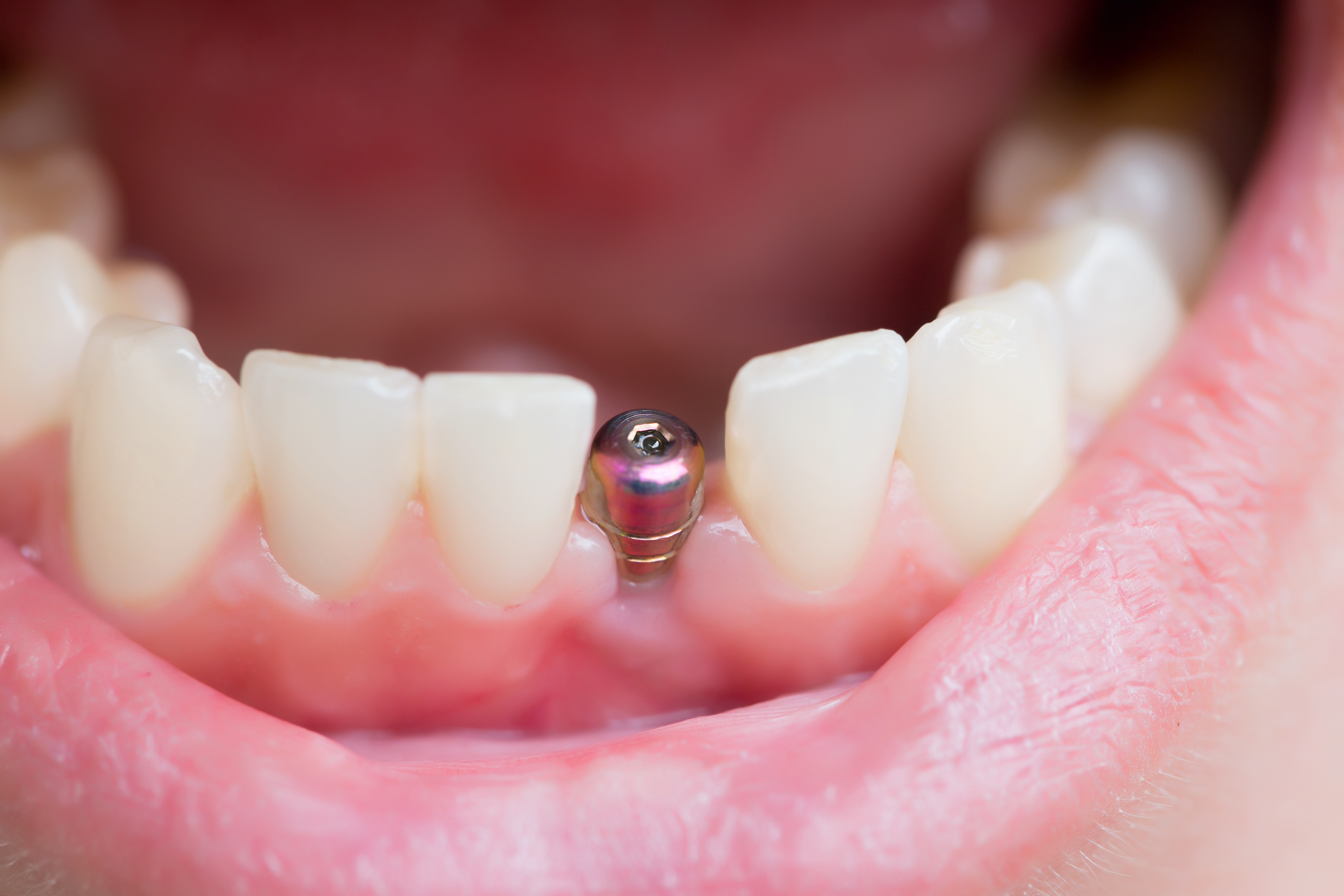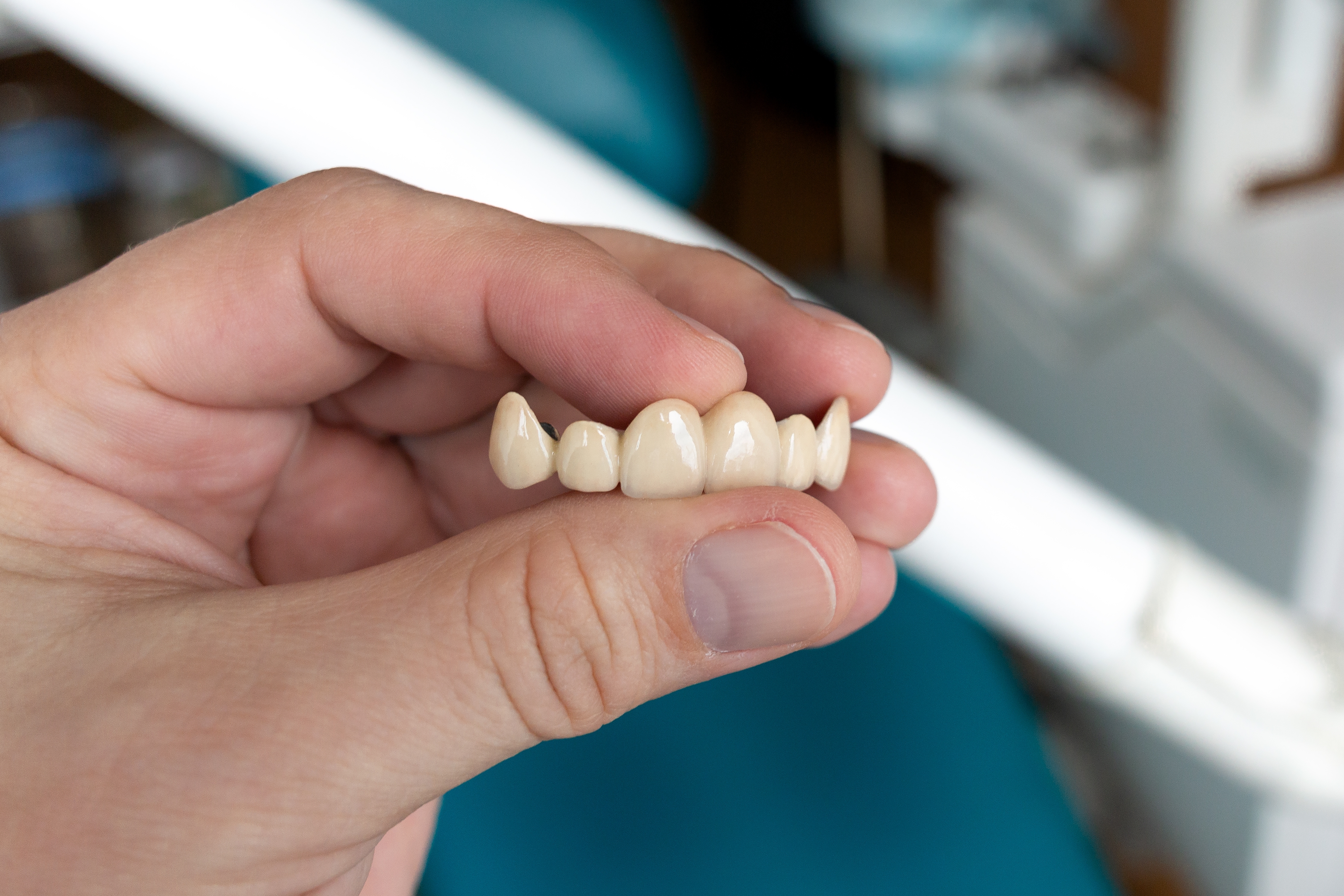Dental implants vs Dentures
Dental implants and dentures are both prosthetic replacements for missing teeth, but they differ in a few key ways.
Dental Implants
Implant treatment is a complex, yet highly sought-after option due to its versatility. With the assistance of a titanium rod surgically implanted into your jawbone, this process can provide you with an attractive and stable way of filling any gaps in your teeth - something that dentures cannot accomplish. As implant treatments come with certain risks, it's crucial that you understand all aspects before making such an important decision for yourself or loved ones. If you're missing a single tooth, several teeth, or all of them - dental implants are the perfect fixed solution for you. Unlike dentures and bridges, they don't use adhesives to stay in place and provide greater levels of comfort and stability due to their more natural feel. Plus, with implant-supported replacements your smile will look just like new.
Pros
Implant-based dentistry is the gold standard for replacing lost teeth. Anchored in your own gums, they look and function just like natural teeth. Unlike dentures, implants are a long-term solution that never need to be replaced - offering you peace of mind now and well into the future.
Implants bring far-reaching advantages - not only do they function like natural teeth, needing no dietary constraints, but their maintenance is also effortless. Most significantly though, implants maintain bone structure in the jaw for long-term benefits. The implant takes on the role of a missing tooth root and integrates with the jawbone – forming an unshakable bond that supports facial structure integrity over time; something people who don't replace lost teeth usually suffer from due to bone resorption causing sunken features.

Cons
- Implants provide a natural look and feel, but you'll pay for that luxury. If you're only replacing one or two teeth, then this procedure may be worth the expense; however, if more than three need to be replaced, it's best to explore alternative options.
- For many, the apprehension of oral surgery is a factor that will prevent them from getting implants. Though they may be advantageous in the long run, implants are an invasive procedure requiring multiple visits over nine months—enough to scare away even the bravest individual.
Dentures
Dentures are designed to cover the gums and provide an easy way to replace lost teeth, with no need for surgery or invasive techniques. Over time though, bone resorption can occur which reduces denture retention and stability in place. This makes it hard to eat properly, speak confidently and securely wear your dentures all day long - something that should be possible.
Denture adhesives can be used to secure the denture to the gums. Denture adhesive is disliked by most patients, and the increase in retention is minimal.
Partial dentures may be an ideal choice for those who retain some of their teeth. When it comes to stability, the shape and location of teeth, design choices, and chosen material all play a significant role. Generally speaking, dentures are usually recommended when there's plenty of bone and healthy gums present in the mouth.

Pros
From the very beginning, dentures have come a long way. Nowadays, your dentist can create dentures that look and feel natural by customizing them to match the color of your gums and choosing an appropriate tooth shade. Unlike implants, you don't need surgery in order to get dentures; they are created using impressions extracted from inside your mouth - although you may have some teeth removed first before getting them fitted.
If you are missing one or more teeth, it can cause your face to sink in and make the remaining healthy teeth look out of place. Fortunately, dentures provide a straightforward solution that supports both your cheeks and lips while also restoring some of the lost facial structure. Those with partial dentures will benefit from easy-to-adjust features if they happen to lose additional teeth down the line as well.
One of the greatest benefits to choosing dentures over implants is their cost-effectiveness. Implants for a handful of missing teeth can accumulate quickly, whereas investing in dentures would be much more economical. On top of that, most insurance policies cover denture expenses—unlike implants which are not typically covered since they're classified as cosmetic procedures.
Cons
Adjusting to dentures can be a lengthy process, and you may find it hard to talk or eat as usual. Furthermore, because they are detachable, dentures have the tendency of moving around or slipping out - an uncomfortable and embarrassing situation for the wearer.
Adhering to dietary restrictions by avoiding hard and chewy foods can help keep dentures in place, yet this is a considerable inconvenience that makes enjoying meals difficult. Additionally, food still may get stuck under the denture even after these limitations have been followed. Although it takes time for anyone to adjust to eating with dentures, usually about 30 days of practice and patience are necessary before feeling comfortable again.
Wearing dentures can be made more comfortable with the help of specifically designed adhesives, however some people cannot tolerate the taste and texture. Moreover, they require regular maintenance; nightly removal for cleaning is necessary to keep them in good condition. Furthermore, these are not a long-term solution as they need to be replaced every few years.
They last an average of six years with proper care before needing to be replaced. Dentures must be handled with extreme caution because they are fragile and can break if dropped or mishandled.

In conclusion
When deciding between dentures and implants, the cost of each treatment as well as the amount of missing teeth will ultimately determine which is best for you. For those without any remaining teeth, a denture might be more suitable; however someone with just several missing teeth may opt for an implant to retain jaw health while enjoying a natural look and feel. At Instasmile we offer clip-on veneers, which are a great alternative to dentures and implants for those struggling with missing teeth. Our pop-on veneers allow you to eat as normal and get a full smile back without having to visit the dentist.
Frequently Asked Questions
Why is it critical to replace missing teeth for long-term health?
Some people would rather live with missing teeth than find a replacement. However, ignoring the issue is not the best solution. Failure to replace a missing tooth can lead to expensive, painful, and long-term health issues.
Which is right for me: implants or dentures?
If you have missing teeth, the most important thing you can do is talk to your dentist and get their advice. They may recommend one solution over the other depending on your health and situation.
How do dental implants measure up?
In recent years, dental implants have gained popularity as a viable alternative to dentures. They cost more than dentures, but they last longer and save you money. Dentures require more visits to the dentist, whereas dental implants require fewer.





 UK
UK
 USA
USA
 Australia
Australia

